After 20 years since the adoption of the Rome Statute, the President of the International Criminal Court spoke about the future of the system designed to deal with the worst crimes that shock the conscience of humanity, as reported by Thomas Verfuss
The International Criminal Court (ICC) in The Hague is gearing up to celebrate the 20th anniversary of the Rome Statute this year, the founding treaty of the first permanent international criminal jurisdiction to deal with the worst crimes that shock the conscience of humankind.
At a diplomatic conference in the Italian capital, 120 states voted for the proposed treaty text on July 17th, 1998. One of its first big successes was its fast entry into force on July 1st, 2002, after the ratifications of at least 60 states had come in much earlier than expected.
During the first 16 years of operations, the Court has been criticized a lot: not enough convictions, an appearance of bias because of an alleged focus on Africa (though it was mainly African states that asked the ICC for those investigations and prosecutions), inability to obtain state cooperation on important issues like the arrest of key suspects, lack of efficiency, and costs that (states say) are too high.
Former ICC President Silvia Fernández de Gurmendi sees four crucial points that will be important for the court’s future.
Universality
The Court has to become “general, non-discriminatory and non-selective”.
Often the question is asked: Why all those Africans in the dock – and why not (for example) George Bush?
“We need first to become universal,” Fernández says, which means that all countries in the world are parties to the Rome Statute.
Then the Prosecutor of the ICC would no longer be unable to pursue grave allegations of serious crimes because of the nationality of the alleged perpetrator. Fernández adds, “Now we have 123 states parties – 70 more to go.”
Adapt to new forms of criminality
“We come from a system to prosecute dictators,” Fernández explains.
‘Nuremberg’ was set up to prosecute former Nazi leaders. At the International Criminal Tribunal for the former Yugoslavia (ICTY), it was the trial of former president Slobodan Milosevic that was most in the spotlight of the media. In modern times, war crimes are often committed by non-state actors like ISIS.
Fernández points to the fact that all ICC convicts till now have been non-state actors, namely militia leaders. (Jean-Pierre Bemba has also been vice-president of the Democratic Republic of Congo, but he was convicted for crimes his militia committed in the Central African Republic, so as a militia leader and not as a former deputy head of state.)
Victims
The ICC “must give a central role to victims”, Fernández adds, although “victims participation and reparation does not make the work of the court easier”. Thousands of victims have participated so far in ICC proceedings. Fernández explains: “We are getting better at giving them rights and reaching out to them.”
The system: common versus civil law
The system of the ICC “must be hybrid”, that is one combining the two major legal systems of the world — common law (which originated in England) and civil law (from the European continent). That hybrid system is “is not always easy to understand and apply”. The ICC must develop “a more cohesive judicial culture”. To achieve that goal, the court must make a “proactive effort to integrate new judges with new ideas”.
In March, six (6) new judges stall start their tenure at the ICC, among whom two are Africans and five are women.
(Judge Fernández of Argentina spoke during an event of Leiden University in The Hague.)







